THE ETHICAL DIMENSIONS OF SPACE SETTLEMENT
THE ETHICAL DIMENSIONS OF SPACE SETTLEMENT
THE ETHICAL DIMENSIONS OF SPACE SETTLEMENT
You also want an ePaper? Increase the reach of your titles
YUMPU automatically turns print PDFs into web optimized ePapers that Google loves.
vegetarian groups 27 . Many of thesearguments can be contained within anethical system variously calledzoocentrism, zootic individualism orextensionism. If regarded from thestandpoint of the Principle of Utility—thatmorality involves maximising happinessand minimising suffering—then individualconsciousness becomes the basis ofintrinsic value. Whilst the debate over thenature of animal consciousness continues,few would deny that “higher” animals atleast have feelings and are capable ofpleasure and pain. Animals are subjects ofa “biographical life” 28 .A zoocentrist would thus assign intrinsicvalue to animals that are consideredsentient (a somewhat ill-defined value set)and would claim the same moral standingfor them as for humans. The adoption ofzoocentrism as our environmental ethicwould require us to treat animals more likepeople. Exploiting animals for food,medicine, science, or degradingentertainment would be immoral and wewould have to strive to uphold animal aswell as purely human welfare.Zoocentrism though assigns no intrinsicvalue to “lower” organisms, and inanimateobjects. These remain of instrumentalvalue to animal-kind. Looking out intospace, we have so far seen nothing ofintrinsic value to the zoocentrist. Ifcolonising space and terraforming Marswould be of benefit to conscious existence,then—to the zoocentrist as well as theanthopocentrist—it would be a right andproper thing to do.EcocentrismEcocentrism (also known as biocentrism)is claimed by its proponents to be the firsttrue environmental ethic since it is basedon holistic principles. To the ecocentrist,all life is sacred and has the right to existand flourish. The living world itself hasintrinsic value: not just at the level ofindividual organisms, but also theecosystems of which they are a part 29,30 .Humans are not regarded as a superiorspecies 31 , but as just one part of thisgreater whole—“plain biotic citizens” is aterm often used—with no right to assertthemselves over and above the will ofnature. Moral behaviour within this systementails serving the welfare of life as awhole: following a Principle of Respectfor Life, often defined as, “… preservingthe integrity, stability and beauty of thebiotic community. 29 ” Since humans haveno privileged place within this community,ecocentrists urge that we dismantle ourenergy and resource-intensive civilisation,reduce our population, and adopt a simplerlifestyle in harmony with nature.Since ecocentrism subordinates the rightsof the individual to those of an holisticabstraction, it has been criticised as amisanthropic and totalitarian ideology 32 .This is not without some justification, asmuch of the progress in ethics over thepast few centuries has involved theextension of individual rights—many ofwhich ecocentrism would require us toabandon. However, much of this criticismonly fully applies to the more extremeversions of ecocentrism. Half the humanpopulation, big though it is, cannot beallowed to starve, however much thismight suit the abstract purposes of thebiosphere. This really would be immoral.The original “Land Ethic” of Leopold hasthus been interpreted by some to meansomething more akin to 33 : the survivalneeds of humans outweigh the survivalneeds of non-humans, but the survivalneeds of non-humans outweigh the nonsurvivalneeds of humans. An ethic such asthis stands not too far removed from some“enlightened self-interest” versions ofanthropocentrism.Vast and fuzzy though the expanded set ofrights holders within ecocentrism is, thesystem still does not assign intrinsic valueto inanimate objects. Life is the basis ofvalue: planets and the rocks they are madeof provide an instrumental stage withinwhich life can play out its destiny. Thus,despite ecocentrism’s hostility towardshuman technology, space settlement andterraforming are not necessarily immoralwithin an ideology such as this. In factquite the contrary: maximising thediversity of life is one of the principles of5
ecocentrism. Undoubtedly however,extraterrestrial life, of whatever kind,would also be assigned intrinsic valuefrom the ecocentric perspective 20 . Wewould have to further the interests ofwhatever life forms we encounter in space.Bacteria at home on Mars would havemoral priority over humans. Theirscientific usefulness to us would beirrelevant as a criterion for theirpreservation. They would be entitled tothis by right. To the ecocentrist,terraforming Mars is only moral if it istruly a barren world.Cosmic PreservationismIt is clear therefore that geocentric theoriesof environmental ethics, when projectedinto space, do not categorise spacesettlement and terraforming as wrong.This has caused some philosophers toreact with concern. Those who believe thatnature should be respected as it is,irrespective of context, feel that whateverthe intrinsic values of terrestrial life and itssubsets, these are not values that can beimposed on the extraterrestrialenvironment. The cosmos has its ownvalues, they claim, and its mere existencegives it not only the right to exist, but theright to be preserved from any humanintent. Such a moral principle we mightcall the Principle of the Sanctity ofExistence, with uniqueness as its basis ofintrinsic value. Moral behaviour undersuch a system would involve non-violationof the extraterrestrial environment and thepreservation of its existing state.Uniqueness is a slippery concept andcould conceivably be applied to allexisting objects, from whiffs of interstellargas to galaxies. The fuzziness of valuedistributed in this way seems to underminethe very point of moral philosophy sinceits only imperatives are to exist and not toprevent other things from existing.Rolston 34 , an exponent of Preservationismhas therefore defined the uniqueness set ascontaining any object—alive or not—of“formed integrity”, or “worthy of a propername”, generated by the "spontaneousconstruction" that arises from the playingout of the laws of nature. His presciption isthat, "... humans ought to preserve projectsof formed integrity wherever found." Mars,and all its features—large and small—would be entitled protection withinRolston's ethic. Rocks would have rightson Mars.To those who are bemused by this idea,Marshall 35 (another cosmicpreservationist) ripostes with the beliefthat intrinsic value is not imposed byhuman beings, but merely involve humanrecognition of value. To him, rocks alsohave a viewpoint that commands respect:existing in, “... a blissful state of satorionly afforded to non-living entities.” Withrespect to Mars especially, Marshalladvocates strict enforcement policies topreserve the planet in its existing, or"natural" state.It is curious to note that, at the end of theirpapers, both these philosophers appear tomake a partial retreat from theirprescriptions. Perhaps these are fall-backpositions in the expectation of strictpreservationism never being accepted.Both urge that if space settlement everproceeds then a representative portion ofthe extraterrestrial environment should bepreserved, but cast doubts on whether thisis realistically possible. If life were to befound on Mars then Marshall augments hisposition with ecocentrism andrecommends permanently quarantining theplanet. Ideally, cosmic preservationistswould like terrestrial life to stay at home,to observe and empathise with theuniverse, not to invade it.REFLECTIONS AND CONCLUSIONS.Would terraforming Mars, and spacesettlement generally, lead to thebetterment of humanity? The answer is alikely yes, given the caveat mentionedabove, that the process is not to thedetriment of the population that remainsresident on the Earth. Would theseactivities be to the betterment of life as awhole? Here, we can reply with a certainyes. Life is a phenomenon at least 3.8billion years old with no intrinsic expiry6
date. Yet our Solar System is middle agedand the Sun’s fiery senescence will ensurethat the Earth will not remain habitableindefinitely. Total extinction of terrestriallife can thus only ultimately be avoided byvacating our planet for a more benevolentlocale elsewhere in the cosmos.Would terraforming lead to the bettermentof Mars itself? It is this question that is atthe heart of the debate. Yet if Mars is abarren planet, does this question even fallwithin the scope of morality?Preservationists would have it so, andothers whose philosophy is less clear cut.It is common at conference debates to hearpeople, whose earth-bound ethic is clearlynot preservationist, articulating apreservationist line with regard to thecosmos. Whilst choosing one’s paradigmaccording to context and personal tastemay be problematic within science, it isnot necessarily so in philosophy. Youcould reject realism (belief in a universalmoral standard) and argue instead forrelativism or pluralism and apply differentethical theories to different situations; andeven if you remained a realist, you havethe initial choice of a wide variety ofbelief systems. But doesn’t this freedom initself cast doubt on the validity of thevalues claimed for non-human, andespecially non-living, objects? It doesseem that, whatever the intrinsic value innature beyond the confines of our humanbodies, since morals are there to constrainour behaviour, values still seem to boildown to what we think and how effectivewe are at influencing the behaviour ofothers.Does a barren Mars really have intrinsicworth, or are the claims to this effectactually human values in disguise? Astriking feature of the ethical spectrumdisplayed in Table 1 is that the further onelooks down the Table, away from theposition of anthropocentrism, the greater isthe moral constraint on human freedom ofaction within the environment and thegreater are our duties towards it. Sincemorality is there to regulate our behaviouralone, these philosophies often resort tojustifying their positions withmisanthropic arguments: gloomy critiquesof humanity that emphasise our capacityfor evil. To the zoocentrist, humans areunnecessarily cruel to our fellow creatures;to the ecocentrist, we are seen on the onehand as nothing special, and on the other,uniquely arrogant and destructive. To thecosmic preservationist, the idea of lettingloose such a wicked and cancerous specieson the Universe at large is nothing short ofan abomination. Misanthropy thus alsoincreases in measure down Table 1, andsince misanthropy is evidently held as avaluable belief by some, it is itself ahuman value of sorts.The same applies to sentimentality, nicelydefined recently as, “the elevation offeelings, image, spontaneity over reason,reality and restraint. 36 ” A prime exampleof this is the ecocentrist notion ofecological harmony: that there exists anideal balance in nature that is perfect,unchanging, and which nurtures andsustains. Yet this is little more than a cosyillusion, based on out of date ecology.Nature is not static and unchanging and isbetter regarded as a continuous state offlux dominated by chaos anddisharmony 21,37 . The history of our planettells us in no uncertain terms that anyharmony that may appear as anepiphenomenon of this state of affairs istransient. Innovation, evolution andextinction—all processes of irreversiblechange—represent the true natural order oflife and, on differing timescales, they are apartial reality for inanimate existence too.And whilst it is reasonable to propose thatanimals with advanced nervous systemsmight have feelings, and therefore a pointof view, surely it is gross sentimentality topropose such a thing for rocks. After all, asentimental terraforming enthusiast mightpropose that, far from the rocks on Marsexisting in a state of “blissful satori” (as apreservationist would have it) they mightinstead be “crying out for life.” Botharguments are unedifying. Rocks don’tthink, don’t act and don’t care. Theycannot have values of their own.Consider two scenarios where life isbrought to a barren Mars and the differingreactions environmental philosophersmight have to each... For the purposes of7
the first, let us propose that we discoverthat microbial life from Earth has alreadyreached Mars, having arrived there atsome time in the distant past by some sortof panspermia process. The possibilitythat bacteria could make such a journeyacross space was first proposed byArrhenius 38 a century ago and has beenrevived in a different guise recently whenit was realised that planets exchangepieces of themselves following impactsenergetic enough to propel debris intospace. Bacteria living in the middle of anejecta fragment might be sufficientlyshielded from heat shock and radiation tosurvive the many years in transit and thefinal trauma of touchdown onto the newworld 39 . Would this discovery be morallycriticised by preservationists? Might theyconsider that founding colony of microbesto have been violators of Mars? Mightthey regard its descendants, the extantpopulation, to be a form of immoralpollution? Of course not. Bacteria cannotbe praised or blamed for being in the rightplace or the wrong place at the right time.The discovery would be regarded as aparticularly noteworthy event in thehistory of life, but one undeserving ofmoral censure. Even the most hard-line ofpreservationists would concede thecontaminating event as a natural event.Arriving on a meteorite, those pioneermicrobes no more polluted Mars than thefirst living cell polluted the Earth.In our second scenario however, it ishumans who take life to Mars, who alterthe climate of the planet so it can support athriving ecosystem. We terraform Mars.Now there is an obvious ethical dimension:would it be right or wrong for us to dothis? Perhaps in the light of scenario onethough, the question can be rephrased. Ifthe unconscious diversification of life isnot a moral issue from the standpoint ofMars, why is it that intentionaldiversification be subject to moralscrutiny? The reason is that only humansare subject to moral praise or blame. It isour own values that are at issue, notfictional ones ascribed to unconscious ornon-living entities. They are the onlyvalues we can know to be real and the onlyones that can motivate both action andrestraint.It is thus the conscious enactment ofchange that preservationists most objectto, in the same manner that ecocentristsobject to it on Earth. But is there anythingfundamentally unnatural or wickedinherent in this ability? No. Whilst we areright to regard the Universe, with all itsprojects, from the vast to the microscopic,with wonder and a degree of humility, theUniverse does seem to be a reasonableplace. It seems to be showing us that it iscomprehensible, if not all comprehended.It is subject to cause and effect, to freewill. Reason therefore, as suggested byPlato and Kant, has a transcendent andautonomous nature. It can be projected aswell as contained within the self. Itsprovince is the Universe at large. Reasoncan enact intentional change. It canlegitimately stand against what is, forideals of what ought to be. Humanconsciousness, culture, creativity—and thetechnological artefacts produced thereby—are thus not unnatural. They have arisenfrom the same physics that gave birth tothe cosmos and the same process ofbiological evolution that followed thegenesis of the first living cell. They are asnatural as sex, photosynthesis, aerobicrespiration, and a host of other biologicalprocesses, all of which were inventedsome considerable time after life’s originand all of which changed the Earthdrastically and forever.Would Mars be a better place transformedinto a living world? Preservationismwould say no, but its movement from whatis descriptively true of Mars to aprescriptive claim is arbitrary andunconvincing. The argument amounts tosaying that humans actually have thelowest degree of intrinsic worth of anyclass of formed object. Rocks are free torust and crumble over the aeons, asteroidsand meteorites free to batter the Martiansurface, and microbes free to hitch a ride ifthey can survive the trip and there toevolve in to new forms that are Martian.Only humans should be constrained fromfulfilling their evolutionary potentialaccording to this philosophy. Yet if space-8
faring is a legitimate activity for microbes,why should it not be so for humans? Theallied ideologies of misanthropy andsentimentality cannot provide asatisfactory answer.There is no fundamental moral objectionto bringing life to Mars as opposed to itoriginating there, or arriving there byaccident. If life begins on Mars during theplanet’s middle age, as opposed to itsyouth, then this is more an issue of timingthan of morality. Life might change Marsbut it will not detract from the planet’suniqueness. This is not to say that there areno moral issues inherent in spacesettlement—there will still be right andwrong ways to go about it—but we willhave to appeal to our own values in orderto resolve them.References1. National Commission on Space,Pioneering the Space Frontier,Bantam Books, New York, 1986.2. J. Lewis, et al. (Eds.), Resources ofNear Earth Space, University ofArizona Press, Tucson, 1993.3. G.K. O’Neill, The High Frontier,Corgi Books, London, 1978.4. R.D. Johnson and C. Holbrow (Eds.),Space Settlements—A Design Study,NASA SP-413, 1977.5. P.J. Boston (Ed.), The Case for Mars,AAS Science and Technology Series,Vol. 57, 1984.6. C.P. McKay (Ed.), The Case for MarsII, AAS Science and TechnologySeries, Vol. 62, 1985.7. C.R. Stoker (Ed.), The Case for MarsIII, AAS Science and TechnologySeries, Vol. 74-75, 1989.8. Y Ishikawa, T. Ohkita and Y.Amemiya, “Mars Habitation 2057:Concept Design of a Mars Settlementin the Year 2057.” JBIS, 43, 505-512,1990.9. R.M. Zubrin and R. Wagner, The Casefor Mars: The Plan to Settle the RedPlanet and Why We Must, The FreePress, New York, 1996.10. R.M. Zubrin (Ed.), From Imaginationto Reality: Mars Exploration Studiesof the Journal of the BritishInterplanetary Society, AAS Scienceand Technology Series, Vol. 91-92,1997.11. O. Stapledon, Last and First Men,Methuen, London, 1930.12. W. Stewart, “Collision Orbit.”Astounding Science Fiction, XXIX(5),80-117, 1942.13. C.Sagan, “The Planet Venus.”Science, 133, 849-858, 1961.14. M.M. Averner and R.D. MacElroy, Onthe Habitability of Mars: An Approachto Planetary Ecosynthesis, NASA SP-414, 1976.15. C.P. McKay, O.B. Toon, and J.F.Kasting, “Making Mars Habitable,”Nature, 352, 489-496, 1991.16. M.J. Fogg, Terraforming: EngineeringPlanetary Environments, SAEInternational, Warrendale, PA, 1995.17. S.J. Armstrong and R.G. Botzler.Environmental Ethics: Divergenceand Convergence, McGraw-Hill Inc.,1993.18. E.C. Hargrove (Ed.), BeyondSpaceship Earth: EnvironmentalEthics and the Solar System, SierraClub Books, San Francisco, CA, 1986.19. R.H. Haynes, “Ecce Ecopoiesis:Playing God on Mars,” in D.MacNiven (Ed.), Moral Expertise, pp.161-183, Routledge, New York, 1990.20. C.P. McKay, “Does Mars HaveRights? An Approach to theEnvironmental Ethics of PlanetaryEngineering,” in D. MacNiven (Ed.),Moral Expertise, pp. 184-197,Routledge, New York, 1990.21. F. Turner, “The Invented Landscape,”in A.D. Baldwin et al. (Eds.), BeyondPreservation: Restoring and InventingLandscapes, pp. 35-66, University ofMinnesota Press, Minneapolis, 1994.22. D. MacNiven, “Environmental Ethicsand Planetary Engineering,” JBIS, 48,441-443, 1995.23. W.H. Murdy, “Anthropocentrism: AModern Version.” Science, 187, 1168-1172, 1975.24. S.J. Gould, “The Golden Rule—AProper Scale for Our EnvironmentalCrisis.” Natural History, Sept, 24-30,1990.9
25. R.M. Zubrin, “The Significance of theMartian Frontier.” Ad Astra, 6(5), 29-37, 1994.26. F. Turner, “Terraforming and theComing Charm Industries,” Adv.Space Res., 22(3), 433-439, 1988.27. T. Regan, The Case for Animal Rights,University of California Press,Berkeley, 1983.28. J. Rachels, Created from Animals: TheMoral Implications of Darwinism,Oxford University Press, Oxford,1990.29. A. Leopold, “The Land Ethic.” A SandCounty Almanac, pp. 201-226, ©1949, Oxford University Press, 1977.30. J.B. Callicott, “The ConceptualFoundations of the Land Ethic.”Companion to a Sand CountyAlmanac, pp. 186-217, University ofWisconsin Press, 1987.31. D.W. Ehrenfeld, The Arrogance ofHumanism, Oxford University Press,Oxford, 1978.32. M. Kheel, “The Liberation of Nature:A Circular Affair.” EnvironmentalEthics, 7, 241-256, 1985.33. J.D. Heffernan, “The Land Ethic: ACritical Appraisal.” EnvironmentalEthics, 4, 235-247, 1982.34. H. Rolston III, “The Preservation ofNatural Value in the Solar System.” inE.C. Hargrove (Ed.), BeyondSpaceship Earth: EnvironmentalEthics and the Solar System, pp. 140-182, Sierra Club Books, SanFrancisco, CA, 1986.35. A. Marshall, “Ethics and theExtraterrestrial Environment.” J. Appl.Phil., 10(2), 227-236, 1993.36. A. O’Hear, “Diana, Queen of Hearts:Sentimentality Personified andCanonised.” in D. Anderson and P.Mullen (Eds.), Faking It: TheSentimentalisation of Modern Society,The Social Affairs Unit, 1998.37. D. Worcester, “The Ecology of Orderand Chaos.” Environmental Review,14(1-2), 1-18, 1990.38. S. Arrhenius, Worlds in the Making,Harpers, London, 1908.39. M.Sleep and K. Zahnle, J. Geophys.Res., 103(E12), 28529-28544, 1998.10


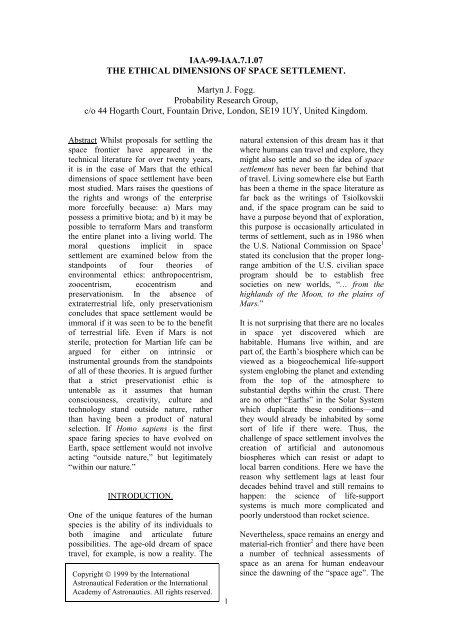
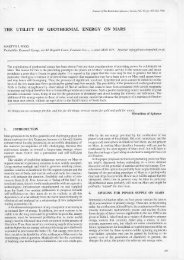
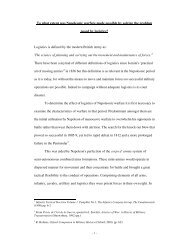
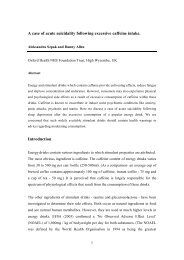
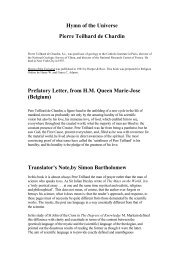
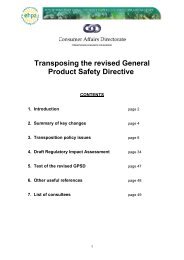
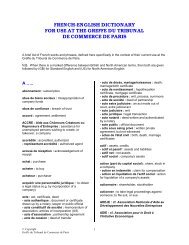
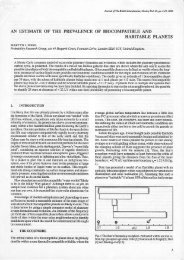
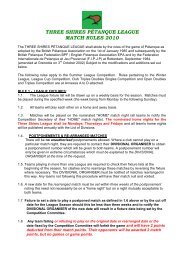
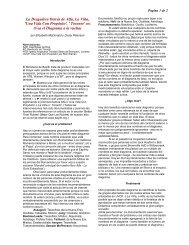
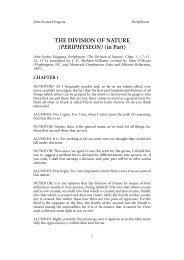
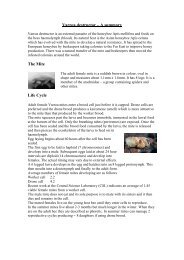
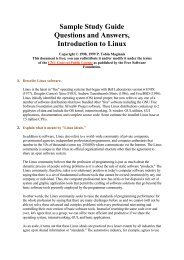
![Tibetan Herbal Medicine Core Curriculum [PDF]](https://img.yumpu.com/32594566/1/184x260/tibetan-herbal-medicine-core-curriculum-pdf.jpg?quality=85)
